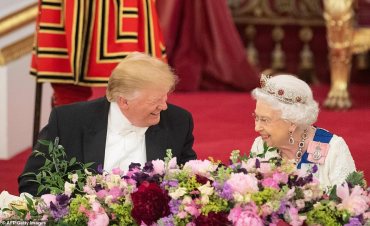“Bear in mind that the Coronavirus Act became law [on March 25] in the UK by Royal Assent. It’s why they are called Rulers, as they set the Rules. Crown Immunity means they don’t have any need to abide by them. Bum deal for us.” commenter, Off Guardian, 4/9/20, “Standing on the Precipice of Martial Law,” Matthew Ehret….Let them eat cake: 4/11/20, “UK: Heathrow Airport demands workers to take pay cut or face dismissal,” wsws.org, Alice Summers

Image: June 3, 2019, Trump and his pal, the Queen, during dinner at Buckingham Palace, getty
………………………………………..
“Coronavirus Act 2020," instituteforgovernment.org.uk
“The Coronavirus Act 2020 received Royal Assent on 25 March, having been fast-tracked through parliament in just four sitting days. The Act contains ‘emergency powers’ to enable public bodies to respond to the Covid-19 pandemic….
52. “Powers regarding public gatherings and premises
The Act gives ministers, including in the devolved administrations, the power to restrict or prohibit gatherings or events, and the power to close or restrict access to premises. The minister can only use this power if they have made an official declaration that the virus constitutes a “serious and imminent” threat to public health, and that using the powers would either help to control the transmission of the virus, or would facilitate the most appropriate deployment of medical/emergency resources. Someone who breaches such a direction commits an offence, punishable by a fine.
59. “The May 2020 elections
The Act postpones elections due in May 2020 for local councillors, mayors of local and combined authorities, police commissioners, the mayor of London and London Assembly until May 2021.
60. “Terms of office
Councillors, mayors of local authorities and combined authorities, London Assembly members, and police commissioners elected in 2021 will serve for three years instead of four. .......
61-70. “Further elections
The Act postpones any by-elections to local authorities, the Westminster and devolved legislatures, and other electoral events until May 2021.”…
…………………………………
Added: UK monarchy propaganda machine can’t allow peasants to know the truth about the virus, for example that it hasn't filled anywhere near the number of US hospital beds that computer models predicted, or that there’s at least one remedy that doctors on front lines are using with great success. Coronavirus Act 2020 creates a whole new profit center for "experts" and a whole new way to strangle the peasants.
April 8, 2020, “Coronavirus Fact-Check #2: “The Emergency Powers Will Only Last 2 years!” Defenders of the Coronavirus Act claim the “extreme measures” are only temporary, but is that true?” Off Guardian
“Those of us who expressed concern at the scope, content and implications of the Coronavirus Act 2020 were often treated to this simple reply:
“It’s not a police state, the special powers only last for two years!”
“This was widely reported in the media and became a go-to talking point for everyone interested in defending the Act.
But is it actually true? Simply put: No. No it’s not.
Section 89 of the Coronavirus Act 2020 details just how many sections and sub-sections are not subject to the expiry clause. As well as all the “conditions” which, if met, would enable Ministers to waive the expiry clause on certain other sections and regulations.
The list is hugely long.
Sections 1, 2, 5, 6, 11, 12, 13, 17, 19(11), 21(7), 59-70, 72-74, 75(1) and 76. As well as parts of Schedules 1, 4, 5, 7, 8 and 10 through 13.
Fully one quarter (and possibly more) of the entire bill will never expire.
What do these excepted clauses cover?
For starters, sections 11, 12 & 13 grant permanent legal indemnity to the government, and any employees thereof, for any harm done when a patient is being treated for Covid19 or “suspected Covid19”.
With a possible vaccine speeding through the testing phase (or skipping it altogether) this could be important down the line.
Sections 59-70 cover the government’s power to postpone elections and are not subject to the expiry clause.
Section 75 totally removes the cap on government assistance to industry when that assistance is “coronavirus related”.
Section 76 simply says:
“Her Majesty’s Revenue and Customs are to have such functions as the Treasury may direct in relation to coronavirus or coronavirus disease.”
Which is peculiarly vague. Whatever it means, it will never expire.
And hanging over all of that is section 89 (3):
“A Minister of the Crown may by regulations make transitional, transitory or saving provision in connection with the expiry of any provision of this Act.”
…which seems to grant the government power to over-ride the expiry of any section of the act, should they deem it necessary.
So, to sum up, no these emergency measures won’t “expire in two years”.
Some of them might expire in 2 years (unless a minister decides they shouldn’t) and others will last forever.”
……………………………………….
More on UK “Coronavirus Act 2020”
“88. Power to turn provisions on and off
This allows UK ministers (and in some cases ministers of the devolved administrations) to make regulations to turn some measures in the Act on and off as needed. Ministers may make different regulations for different purposes or areas. Many measures, including powers relating to potentially infectious people and to limit events and gatherings cannot be turned on and off in this way.
89 and 98. “How long measures will last for
Most of the Act will stop having effect two years after it is passed. Some provisions, including certain provisions relating to the emergency registration of health professionals and indemnity of health service activity do not expire after two years.

.......
[Image: “Ivanka Trump and Secretary of State for International Trade Liam Fox arrive through the East Gallery during the State Banquet at Buckingham Palace, London, Monday, June 3, 2019. U.S. President Donald Trump is on a three-day visit to the United Kingdom. (Victoria Jones/Pool Photo via AP)”]
Following government amendments in the Commons, MPs will now have an opportunity to express a view on the continued operation of the Act’s temporary provisions every six months. Every six months, a minister must, ‘as far as practicable’ make arrangements for MPs to vote to keep the provisions of the Act in force. If MPs are able to vote and vote to stop against keeping the provisions of the Act in force, the government must make regulations to prevent provisions having effect within 21 days. MPs will only be able to vote on the continuation of the powers if parliament is sitting. If they are not able to vote, the powers will remain in force.
90. Power to change the expiry date of the Act
A UK minister (and in some cases a minister of the devolved authorities) may make a regulation to extend some provisions of the Act beyond the two-year time period (for a maximum of six months). The time period may also be reduced….
The exercise of powers in the Act is subject to different levels of scrutiny, including:
*Draft affirmative procedure: requires parliament to expressly approve a measure before it comes into effect
*Made affirmative procedure: allows a measure to come into effect immediately, but requires retrospective parliamentary approval to continue.
*Requirement to lay before parliament: allows a minister to make a regulation without parliamentary approval, but requires the regulation to be laid before parliament as soon as reasonably practicable.
The Act also contains powers to make directions, arrangements, guidance or determinations, which are not subject to parliamentary procedure.”…
…………………………………

No comments:
Post a Comment